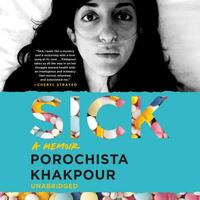Take a photo of a barcode or cover
While Khakpour is a graceful writer, Sick is confusing and a bit tedious at times – but so is chronic illness. "Haven't we been here before?" I found myself asking throughout. She chooses to tell the story nonlinearly, organized roughly by place, giving the reader a sense of searching that matches her own search for a cure or at least a diagnosis.
She writes, "There was never a home for me outside as there was never a home for me inside—my own body didn't feel like my own." I wish she'd gone deeper; there's something worth focusing on here about the connection between physical illness and a more spiritual sense of displacement as an immigrant and child of the Iranian Revolution.
She's unflinching in how she portrays herself, and many good qualities come through as well as a few moments that made me cringe. Moments like that were a good reminder to me that the point of a memoir isn't to be likable; it's to tell a story that means something.
And the deal with so many chronic illnesses is that most people won't want to believe you. They will tell you that you look great, that it might be in your head only, that it is likely stress, that everything will be okay. None of these are the right things to say to someone whose entire existence is a fairly consistent torture of the mind. They say it because they are well-intentioned usually, because they wish you the best, but they also say it because you make them uncomfortable.
She writes, "There was never a home for me outside as there was never a home for me inside—my own body didn't feel like my own." I wish she'd gone deeper; there's something worth focusing on here about the connection between physical illness and a more spiritual sense of displacement as an immigrant and child of the Iranian Revolution.
She's unflinching in how she portrays herself, and many good qualities come through as well as a few moments that made me cringe. Moments like that were a good reminder to me that the point of a memoir isn't to be likable; it's to tell a story that means something.
I'm really fascinated with the mystery that courses through every part of this book. Lyme disease being the big one, as an illness that is hard to diagnose and treat. This is not an illness memoir with a neatly packaged ending. Porochista Khakpour's journey to a diagnosis is a long one, and even when she finally gets the Lyme results, there's no concensus from doctors on when she got it. There's no specific formula, through medicine or lifestyle, that ensures good health periods - it's seemingly hard to tell when Khakpour will go through another rough spell. She's plagued by anxiety and depression, and it's hard to know if they're overtly a part of Lyme or a sort of side effect that comes from uneven periods of health and sickness and cycling through doctors who either don't know what to do with you or don't always take you seriously. The uncertainty her whole life takes on is painful to read, and anyone could easily understand the hopelessness Lyme sufferers may feel.
And then because of her illness (or maybe not?), mystery threads through other parts of the memoir. Geography becomes a player in Khakpour's life, as she comes to see that living in some places ground her in good health, while others send her spiraling down. Her relationships don't read entirely fleshed out - the men she's romantically involved with are somewhat two-dimensional on the page, and most of them float in and out of her life, initially promising to stick by her side through her illness, but flaking out in the end, unable to handle their roles as caretakers. It's tough and messy, and Khakpour isn't always a hundred percent certain of what's going on. But through the unknowns, her strength manages to show through.
Khakpour is a smart writer, and I look forward to more from her, whether about her illness or not.
And then because of her illness (or maybe not?), mystery threads through other parts of the memoir. Geography becomes a player in Khakpour's life, as she comes to see that living in some places ground her in good health, while others send her spiraling down. Her relationships don't read entirely fleshed out - the men she's romantically involved with are somewhat two-dimensional on the page, and most of them float in and out of her life, initially promising to stick by her side through her illness, but flaking out in the end, unable to handle their roles as caretakers. It's tough and messy, and Khakpour isn't always a hundred percent certain of what's going on. But through the unknowns, her strength manages to show through.
Khakpour is a smart writer, and I look forward to more from her, whether about her illness or not.
challenging
emotional
hopeful
informative
inspiring
reflective
sad
tense
slow-paced
When I think about the women I’ve known who have struggled to get a diagnosis for something they have been suffering from, it sounds a lot like Porochista’s experience. It’s well-written, smart, and personal, and I know this will be a valuable account on the gray area where mental and physical health meet.
This book read like a jumbled mess to me.
It seemed really stream of conciousness in a bad way.
In the end I did skim a bit just to be done.
I'm sad.
Because her story is actually super important. Her Lyme disease is misdiagnosed and she keeps getting told that it's all in her head. Which is something that is imfuriatingly common in young women especially women of color and people on the trans spectrum assigned female at birth.
But this book was just so inaccesible.
If you don't know what Lyme disease is before going in there is no way you understand much of it by the end.
Porochista has gone through a range of other traumatic experiences in her life as well and for the most part there is not even the attempt to differentiate between PTSD and Lyme and accident related issues.
She talks bout writing this book in part while she was really sick and maybe that is the problem...
It seemed really stream of conciousness in a bad way.
In the end I did skim a bit just to be done.
I'm sad.
Because her story is actually super important. Her Lyme disease is misdiagnosed and she keeps getting told that it's all in her head. Which is something that is imfuriatingly common in young women especially women of color and people on the trans spectrum assigned female at birth.
But this book was just so inaccesible.
If you don't know what Lyme disease is before going in there is no way you understand much of it by the end.
Porochista has gone through a range of other traumatic experiences in her life as well and for the most part there is not even the attempt to differentiate between PTSD and Lyme and accident related issues.
She talks bout writing this book in part while she was really sick and maybe that is the problem...
emotional
hopeful
informative
medium-paced
Good!! Deals with topic of chronic illness well. Just hard to read all at once because it’s so heavy. But it’s honest and I appreciate that.
dark
emotional
reflective
medium-paced
This book deals with A LOT of heavy topics (tw: suicidal ideation, addiction, medical trauma/gaslighting, toxic relationships), but not in a way that veers towards trauma porn. Instead Khakpour wades through the discomfort and the ableism and the expectation for sick people to remain out of sight and cracks open her pain and messiness and aliveness. She pulls back the facade of certainty and pulls apart the myth that health is stable and within our individual control. And all of this grounded in place and an incredibly engaging voice.
I found parts of the book a bit repetitive at times and the timeline could be a little difficult to follow, but overall I saw so many of my own experiences between these pages and I am so grateful to Khakpour for opening space for sick storytelling.
I found parts of the book a bit repetitive at times and the timeline could be a little difficult to follow, but overall I saw so many of my own experiences between these pages and I am so grateful to Khakpour for opening space for sick storytelling.
"At some point I questioned why I had for much of my life leaped from one person to another, with no end in sight. I'm not sure my conclusions are good, but I can tell you when the body feels out of place it will cling to anything that looks like life. Cities. homes. People. Lovers.
Love is the only good way many of us know how to feel alive.
And the ghost I so often was wanted badly to feel real. And the characters in this section can at least tell you I existed. They might not have thought of me much, but they can tell you I was real. Sometimes too real."
Graphic: Ableism, Addiction, Chronic illness, Drug abuse, Mental illness, Suicidal thoughts, Medical trauma, Gaslighting
Moderate: Domestic abuse, Racism, Rape, Xenophobia, Car accident
Minor: Miscarriage, Self harm, Islamophobia
While I don’t share the author’s diagnoses, so much of what she shared resonates, the most impactful being:
‘the thrill of the sick person making herself sicker
If you know a part of you is always dying, taking charge of that dying has a feeling of empowerment
My body goes against me often so what if I put it through that myself’
‘the thrill of the sick person making herself sicker
If you know a part of you is always dying, taking charge of that dying has a feeling of empowerment
My body goes against me often so what if I put it through that myself’







